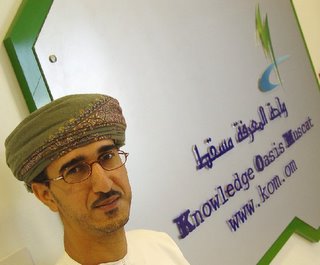 Mohammed Al Maskari (pictured) never imagined he’d be running Knowledge Oasis Muscat (KOM), Oman’s first Technology Park. As a first generation college student who received a BSc from Sultan Qaboos University, Maskari dreamed of becoming an academic until the moment he discovered IT.
Mohammed Al Maskari (pictured) never imagined he’d be running Knowledge Oasis Muscat (KOM), Oman’s first Technology Park. As a first generation college student who received a BSc from Sultan Qaboos University, Maskari dreamed of becoming an academic until the moment he discovered IT.“My own education was such an opportunity that I’ve always felt lucky to be involved with a profession that creates options for people.” According to KOM colleagues he “focuses on the little things that add up to the big successes. He will say that he’s a globalist, because he understands the small details as well as the big picture.” Maskari also has the reputation for identifying talent and managing with a hands-off style. Hisham Al Zubaidi, PEIE’s Marketing and Comunications Director, says, “He can catalyze the best people without having to micro-manage their activities.” It’s a skill that Maskari says he learnt from Mohammed Al Ghassani, PEIE’s Executive Vice President. “Given the nature of KOM and the pace at which the Park works I’ve had to become an effective delegator and get myself out of the way and let people succeed,” he says.
PM: But where does Maskari see ICT developing in Oman? What are the opportunities and threats?
Security is a major concern. Aspects of government and the private sector aren't thinking about security as they need to. The banking industry, in particular, isn't reacting quickly enough to the issue of security by building in simple checks for online commerce. In 2005 the fastest growing crime of the 21st Century is identify theft. For example, European research suggests that one in 20 European internet users have lost money through online scams. Almost half say they have received so-called phishing e-mails aimed at tricking them into revealing details like online banking passwords. Other frauds include paying for items which never arrive and sending cash following a demand from a bogus e-mail. Copyright remains an issue; we still need to make information available to the widest possible community whilst ensuring we respect the rights of copyright holders.
The Digital Divide is an issue we’ve got to tackle. It's not just about people who have access to IT and those that don't, it's not just about haves and have-nots. It's about people becoming knowers and know-nots; and doers and do-nots; those who can communicate with the rest of the world and those that can't. This is a challenge and we need to find a solution to fix it. The dangers of not doing that are great.
There’s a lot of discussion about wiring classrooms. In fact, research suggests that wiring a classroom doesn't do that much for the educational performance of children. What matters - the really significant variable - is whether or not the teacher has that training to put that technology to good use. One opportunity that the introduction of computers in the classroom offers is the opportunity to re-think what it is that teachers should be able to do in the classroom. What are we training them? How are we supporting them? How are their days structured? How do they get to develop lesson plans? Whether or not we actually put technology in the classroom, we probably ought to be thinking about how we train teachers for the kind of education that we want for our children.
The entertainment industry has no plans to leave our living rooms anytime soon. The market for electronic games is expanding. As it stands today, the game industry is doing extremely well by any other economic standards. It's maintaining growth and continues to thrive. To grow the industry in its current fashion without any real effort, all Sony and Microsoft need to do is continue to market the same consoles and the same games to the same demographics, and they’ll continue to make sales based on the current demographics making continued purchases, while appealing to the younger generation of gamers. Given the demographics of the Middle East I think there are tremendous opportunities for software developers that are interested in the gaming sector – if you consider the entry costs, perhaps gaming for mobiles rather than consoles is the way forward.
KOM’s promoting Oman as a prominent location for Indian IT companies to establish their Middle East operations. We’re actively following up and encouraging inward investment enquiries from India onto KOM. We’re already home to a small but important group of Indian-owned businesses. Indeed, KOM views India as a tech-rich emerging market from which to draw inward investment.
PM: What are your future plans?
We’re bent on increasing KOM’s geographical reach and appeal, strengthening our networking with local and international partners and occupying a frontline position in service delivery to knowledge-driven businesses. Indeed, we’re open to assistance and collaboration in realizing these goals.